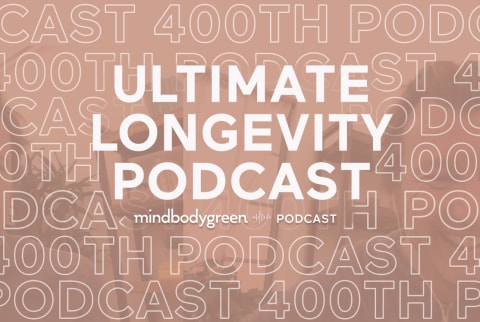Advertisement
3 Longevity Hacks You Shouldn't Ignore, From The 400th Episode Of The mbg Podcast


Hear, hear: We've made it to the 400th episode of the mindbodygreen podcast! This milestone of 400 speaks to the longevity of our show, so in the spirit of longevity, we've compiled the greatest nuggets of healthspan and lifespan advice we've heard on the podcast. Consider it the ultimate longevity episode from our established, thriving library of incredible doctors, experts, and deep dives into emerging science.
Of course, this article below does not represent all the advice we discuss in the episode (just imagine the word count!), so make sure to tune in to hear every highlight. But in the meantime, these three longevity hacks can help you along your well-being journey. A bonus? They don't cost a penny:
Hydration.
Listen, hydration is huge for brain health. Your brain is literally made up of water (75% to be exact!), so it needs fluids in order to work properly. "[Water is] going to help keep your blood pressure normalized; it's going to help flush out [waste] from your cells; it keeps your cells metabolically active and healthy," says neuroscientist Kristen Willeumier, Ph.D., author of Biohack Your Brain, all of which are important functions for brain health.
And according to Willeumier, water is crucial for memory and mental clarity—and who doesn't want to maintain memory as you age? "When you have a 1 to 2% drop in hydration, you can start to have signs associated with brain fog1," she says, like feeling tired, headache, and poor concentration. Another study shows that when a group of young, healthy women restricted their water intake to no more than 6 ounces in one day, they performed worse on cognitive tests that required visual and working memory2; after they drank enough water and repeated the tests, their executive function went back to baseline.
"So If I'm going to work with somebody and help them to have a better memory, the first thing I say is: 'How much [water] are you drinking?'" says Willeumier. In terms of how many ounces you need, well, that exact number differs for everyone (generally, though, experts recommend you drink half your body weight in ounces of water). Just take it as a sign to regularly refill your glass or reusable water bottle and get sipping. You can also opt for hydrating foods to meet the threshold: "You can get 20% of that water from hydrating fruits, vegetables, or green juices," Willeumier adds.
Social connection.
"Something called social integration—having a romantic partner, having friends, or being connected to your community" can increase years of life3, notes science journalist Marta Zaraska, author of Growing Young: How Friendship, Optimism, and Kindness Can Help You Live to 100. Sure, eating your veggies and exercising regularly can do wonders for your overall health, but according to Zaraska, without quality connections, you won't ever reach peak healthspan.
See, says Zaraska, loneliness can make you more prone to myriad health issues. According to one study, being lonely had an impact on the immune response of first-year college students4, compared to those who were not as lonely. This can be really bad when you're trying to stay well, she says. "On the other hand, connecting with others can really boost the immune system." For example, she cites a study with 184 elderly people that showed happily married individuals have a more robust immune response5 when their immune systems are activated, compared to people who felt lonely.
The bottom line? Connecting with others can have powerful, tangible benefits for your health, and those social interactions don't even have to live on a giant scale. "Things like kindness and volunteering can protect your antiviral response," she adds (a concept commonly dubbed the "Mother Teresa effect"6).
Breathwork.
Ever heard of hormesis? The concept refers to short, intermittent bursts of certain stressors (called "hormetic stressors") that can trigger a cascade of cellular processes that make you more resilient to future physical and mental stress, thus enhancing longevity. And breathwork practices can serve as an effective hormetic stressor—specifically, breath holds.
"You take a normal breath in and out through your nose, pinch your nose, and hold. Then start walking with the breath hold and go into a jog. Keep going until the air hunger is quite strong, and then let go," explains breathing expert and bestselling author Patrick McKeown. Perhaps start with a simple walk, working your way up to a jog after a few sessions.
This exercise also reduces your carbon dioxide sensitivity—which, in case you didn't know, is an important marker for top-notch respiratory strength. "What that can do is increase carbon dioxide in the blood, and it can help to reduce your sensitivity to the gas," McKeown adds. "That's something we use a lot with athletes, but it does more than that: It will open up the nose; it will open up the lungs; it will increase blood flow to the brain."
Not to mention, this breathwork technique is easy and free, making it one of the most powerful tools in your longevity tool kit. After all, you breathe more than 20,000 times a day—why not take advantage of some of those inhale-exhales?
The takeaway.
These three hacks represent only a snapshot of our must-have longevity tips, so be sure to listen to the episode down below to hear the full repertoire. On that note, thank you for listening—we at mbg are extraordinarily grateful for your thoughtful reviews and comments. As always, if there's anything you wish we would cover on the podcast (or any guests you think we should chat with!), please drop us a note at podcast@mindbodygreen.com. Be well!
